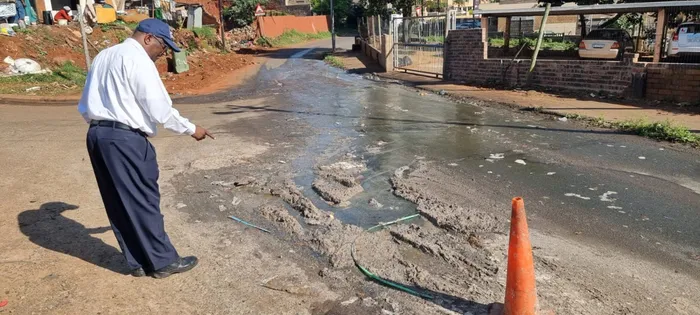eThekwini aims to make use of wastewater, sludge productively

An official from the eThekwini Department of Water and Sanitation inspects a overflowing wastewater pipe leak An official from the eThekwini Department of Water and Sanitation inspects a overflowing wastewater pipe leak on Sheringham Road in Overport, Durban. File Picture: Supplied
Durban - The eThekwini water and sanitation (EWS) unit is looking to test key technologies in a bid to find ways to make productive use of wastewater and sludge.
The City said it was collaborating with research institutions to find new technologies that aim to provide improved water and sanitation systems that are economically and environmentally sustainable.
Among the projects in the works is the demonstration of non-sewered sanitation systems in informal settlements and the demonstration of sludge treatment technology.
Speaking on the City’s online platform, “eThekwini matters”, Lungi Zuma, the acting project executive for Research and International Relations in the municipality’s Water and Sanitation Unit, said they were looking at research taking place in other parts of the world with such technologies with the hope of finding a solution that could be applied to eThekwini.
She said issues such as climate change and rapid migration to the City meant the municipality needed to keep up with innovation and look at new technologies.
She said one of the projects they were working on focused on sanitation technology.
“We are working with international partners and national water research commission of South Africa in demonstrating three different technologies at informal settlements’ community ablution blocks.
“What these technologies do is that they treat wastewater generated at a local level up to a standard where the treated wastewater can be recycled to flush the toilet. How this helps us is that we can roll out water-borne sanitation in areas where we do not have bulk sewer infrastructure.
“It’s quite expensive to put in long sewer lines and treatment works are expensive and also take a long time so these technologies can be quickly deployed. They save water in that the treated water is used to flush the toilet, making them very environmentally sustainable,” she said.
Zuma said there were three different technologies they would be testing at informal settlements and the hope is to have the technology on the ground by January next year.
Speaking on the municipality using technology to find productive use of sludge, she said there were different types of sludge that were generated from wastewater treatment plants.
“What we are aiming for with the project is to install two different types of sludge treatment technologies. To treat the sludge and create useful products that can be used as soil conditioners, fertilisers and others that can create products that can be used as a fuel source.
“We want to create value in something that is generally considered a waste,” she said.
Related Topics: